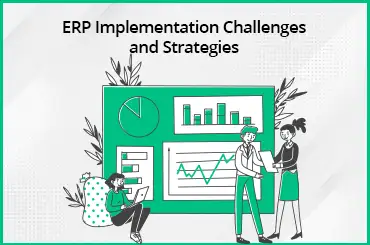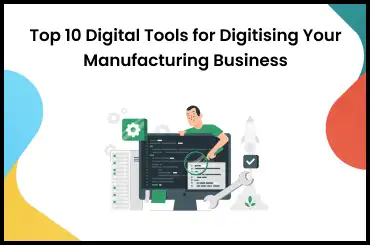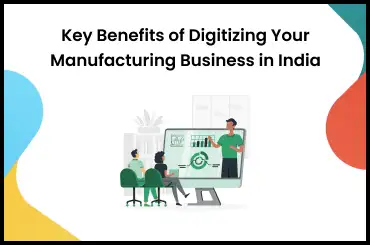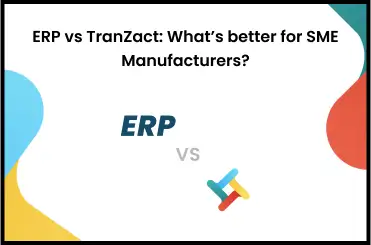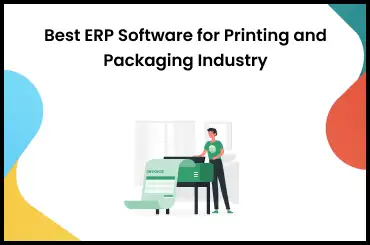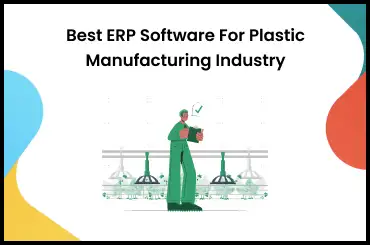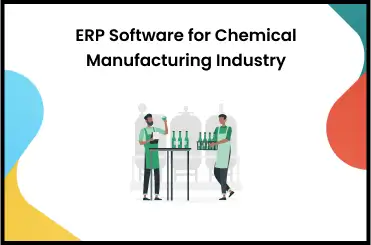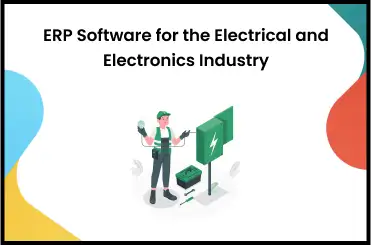Enterprise Resource Planning or ERP for small businesses allows manufacturing businesses to digitise operational processes and move away from manual workload. ERP systems change the way manufacturing businesses manage their processes, from accounting to procurement, manufacturing to sales, and everything in between. This allows SME manufacturers to scale upwards quickly.
However, every business is different and has unique requirements. Because of that, you need to find out if you need an ERP or not. And if you do, then which software will suit your requirements best? The best ERP system for small businesses adapts to your business in no time. It is easy to use and supports data-driven decision-making. Let’s look at the best ERP software for small businesses.
List of Best ERP for Small Business
Here is a list of ERP systems. You can find your best ERP system for small businesses from these. Base your decision on their price models, key features, pros and cons.
1. Tally ERP 9
Tally is one of the oldest ERP software programs in the market, offering technology and innovation solutions. It’s a complete enterprise solution for small & medium enterprises. Tally ERP 9 provides comprehensive business functionalities from Accounting to Payroll etc.
💰Pricing:
- Tally offers plans ranging from Rs 750 for a single user, up to Rs 67000 for multi-users, per month. It also has other lifetime plans.
★ Features:
- Tally manages bills and payables and generates reports.
- It offers inventory management and human resource management.
- It provides supply chain management, credit, and cash flow management.
👍Pros:
- It provides bookkeeping, cost control and cost analysis solutions.
- It automatically calculates interest in payables and receivables.
👎Cons:
- Since the learning curve is steep and the tool is complicated, only well-trained users can use it.
2. Oracle ERP
Oracle is a cloud-based software that automates project planning, governance, and risk management. It offers advanced capabilities, such as AI, analytics, and automatic updates.
💰Pricing:
- They have different prices for various services. Therefore, pricing plans depend on your business requirements.
★ Features:
- Oracle ERP Automates procurement and supply chain processes.
- It helps to manage inventory, orders and maintenance.
- It also provides key business analytics.
👍Pros:
- This software leverages artificial intelligence and machine learning.
- It has a global presence catering to companies across the world.
👎Cons:
- It is not specifically built for Indian small businesses.
3. TranZact
TranZact is a cloud-based software, designed especially for SME manufacturing businesses. It's a business automation tool that provides the best ERP system for small businesses. It digitizes end-to-end business processes, right from sales inquiry to dispatch.
💰Pricing:
- TranZact offers customizable solutions for SMEs at affordable rates, with paid plans starting at only Rs. 0. Its base paid plan starts from 47999 and goes up to Rs. 359999 annually.
- TranZact’s free plan for small businesses allows businesses to explore and use all the base modules for free. Users can upgrade to the paid plans when they require advanced features.
★ Features:
- TranZact integrates all core manufacturing modules including sales, purchase, production, inventory and materials planning.
- It provides end-to-end business automation and insightful documentation for better decision-making.
- TranZact also tracks and manages quotations, purchase orders and GST-compliant invoicing.
- It effectively manages production cycles with a multilevel Bill of Material, production planning and testing solutions.
- It offers a smart business dashboard powered by business intelligence, along with top-notch chat support.
👍Pros:
- It is easy-to-use software and does not require complex technical training.
- TranZact's free version is valid forever, making it the best ERP system for small businesses.
- It integrates with Tally for accounting and Excel for enhanced operational convenience.
- It enables instant document sharing on WhatsApp and Email.
- It is seamlessly integrated with all core business modules for enhanced productivity.
👎Cons:
- The software does not have CRM functionalities for managing customer relationships.
- It does not have HR module since it is mainly made for manufacturers and traders.
4. SAP ERP
It is cloud-based and on-premises software for managing multiple business processes including finance, manufacturing, human resources, supply chain, services, procurement, and other functions on a single platform.
💰Pricing:
- SAP ERP requires you to incur one time cost of erp system for small business for a lifetime subscription
★ Features:
- It handles accounting, financial management, supply chain and risk management.
- Within financial management, SAP ERP provides governance, risk and compliance solutions along with treasury management and tax management.
- It enables application development, sourcing and contracts.
👍Pros:
- It simplifies business processes and comes with built-in machine learning.
- It offers R&D and engineering solutions for enterprise projects.
👎Cons:
- The user interface is complicated.
- It's more suitable for large corporations.
5. SAGE 300 ERP
It is a business management software that supports management of finances, operations and inventory across industries. Sage 300 ERP automates your workflow throughout your organization.
💰Pricing:
- It comes with customized quotes that are offered on a case-by-case basis.
★ Features:
- SAGE ERP Manages accounting, payroll, and financial operations.
- It helps with purchase order and sales order management.
- It also offers project and job costing solutions.
- It has a distinct human resource and customer relationship management software.
👍Pros:
- It helps to integrate processes like budget management, sales management and payments.
- The software offers distinct solutions for financial operations and international business.
👎Cons:
- SAGE ERP does not specifically cater to the production concerns of small businesses.
What Is Small Business ERP Software?
ERP Software is an automated tool used by companies to manage and integrate the most important functions of their business. This includes purchasing, sales, inventory, resource planning and more. For a manufacturing business, ERP software acts as a centralized platform. It coordinates and supervises diverse teams, tasks and timelines. This ensures smooth business operations.
In a small business, ERP software helps to increase productivity and reduce inefficiencies. It does so by transferring accurate and real-time information across key business channels. cloud ERP systems for small businesses help department managers stay on top of all workflows. Then, they continue to deliver high-quality goods, alongside ensuring rapid business growth.
What do small businesses need from ERP software?
To pivot towards consistent growth, here are a few requirements that small manufacturing businesses must look for in ERP software.
1. Integrated Transactions: Easy integration and collaboration are crucial for SMEs. When adopting an ERP solution, small businesses often face challenges as there is a lack of oversight. Moreover, it can be a tough task to manage sales, purchase transactions, inventory and material planning manually. The best ERP system for small businesses would integrate and gather data, generate reports, share documentation, and communicate with stakeholders. All of this happens with zero manual effort.
2. Business Intelligence: SMEs need end-to-end visibility of operations to optimize time-consuming business operations. The data must be easily visible. The best ERP software for small businesses should show data in smart business dashboards. This helps in tracking business performance regularly. They also provide real-time productivity insights.
3. Vendor Management: The ability to access buyer, supplier and vendor information on a single platform is a key requirement in an ERP solution for small businesses. This ensures that business owners can simplify vendor management processes and strengthen stakeholder relationships.
4. Accounting & Sales Integration: Finance and accounting are one of the most important areas of your SME business. However, not all ERP tools can be integrated. With the help of an ERP, small businesses can accelerate business management. A small business ERP software should also track sales and marketing activities. It should tell you how much sales your business is making and what products are not selling well.
5. Order Management: The ERP system for a small business should also track orders and create demand forecasts automatically. That will ensure you always have adequate stock to meet your customers' demands. It also lets you track consumer data and deliver orders on time always. This helps you maintain strong customer relationships.
Features of Small Business ERP Software
ERP software plays an important role. It streamlines operations but also propels growth. Here's a list of key ERP software features for a small business:
- Automating Tasks: ERP software adapts and grows with your business. It automates processes, saving time and boosting profitability.
- Manufacturing Support: It manages the entire production cycle. This ranges from raw materials to finished goods, and ERP management software keeps track of all.
- Inventory Management: ERP software records all your transactions. It ensures optimal stock levels and prevents overproduction.
- Data-Driven Analysis: With an ERP, you will have no manual record-keeping. It will give you instant access to crucial data for informed decision-making.
Benefits of ERP for Small Business
There are numerous financial and operational benefits of ERP software for SME manufacturing businesses. Let's look at some of the key benefits:
- ERP software makes sure the stock levels meet customer demands and prevents overstocking. This increases productivity by making the best use of resources.
- It automates time-consuming tasks like accounting, order management, and inventory management. ERP business management software makes everything from purchase orders to bills of materials easy to control.
- Small business ERP software tracks customer demands and allocates resources, accordingly. It also handles GST invoices and other documentation. It also increases customer satisfaction with timely updates and quality services.
- ERP software provides seamless coordination between various departments. This includes production, accounting, and customer relationship management. This makes sure that there is timely production, delivery of customer orders, and receipt of payments and supplies.
- It maintains all business records, from customer orders to sales data in one place. Your team can access all the information, anytime.
- ERP software provides real-time updates and insights on your business operations. You will not have to wait for manual data collation. It will give all the latest information to your fingertips.
Pricing of ERP How Much Does Small Business ERP Software Cost?
The price of ERP software depends on many factors. This includes the number of concurrent users, solutions offered, maintenance charges and other costs. The cost of ERP for a small business can be as low as Rs 1000 per month. But it can also range up to Rs 1-2 lakhs depending on the services and the size of the business. Cloud-based free ERP software for small businesses is affordable.
TranZact offers the best ERP system for small businesses. It also offers all its base ERP functions for free, forever. With its free plan, SMEs can explore the platform and start using it for free. They can also switch to paid plans when they're fully assured of the product. The unique thing about TranZact is it is customizable. This means that you will only have to pay for what you want.
How Is ERP Used in Small Business?
It's a myth that ERP software is needed only by large organizations. You can use ERP for a small business in many ways. The goal is to make your SME business operations simpler and more efficient. Here are the 3 most important uses of an ERP in small businesses:
1. As a management tool: ERP software enhances performance by efficiently managing data and empowering business growth. It helps track every operational data point, providing a comprehensive view of business areas that need attention.
2. For risk management: ERP tools remove the need for manual data handling. This decreases the risk of errors and protects your business from costly mistakes. They provide accurate demand and supply data. This prevents supply shortages or overproduction.
3. For employee collaboration: ERP software works as a centralized system for easy employee collaboration. It helps in project management, boosting productivity and allowing faster product delivery to customers. This increases customer satisfaction.
When Should You Implement ERP?
Deciding when to implement an ERP system is an important decision for any small business. Here are some key indicators that it might be time:
- If you're looking to speed up key business operations and improve your production and inventory schedules to minimize costs, an ERP system can be a valuable tool.
- As your manufacturing company grows, managing everything becomes difficult. An ERP system can streamline various processes, from quotations and inventory to accounting.
- The best ERP system for small businesses can provide a competitive edge by reducing costs, improving management, optimizing production, and boosting adaptability.
- If your existing business systems are failing to grow with your business. If they have become inefficient due to capacity overload, or do not provide adequate data on customer demands, consider a small business ERP system.
- Delays in deliveries due to outdated systems can impact your business revenue. Upgrading to an ERP system can make sure that you deliver on time and maintain customer satisfaction.
How to Choose ERP for Small Business?
While choosing an ERP for a small business, you must consider how well it integrates and automates the diverse heads of your business operations on a single platform. Here are the three most important things to keep in mind while choosing the best ERP system for small businesses.
- Make sure it is cloud-based.
- Check if there's a free version.
- Is it user-friendly and cost-effective?
Raise Your Business' Bottom Line With A Powerful ERP
ERP systems are very important for handling the operational tasks of a manufacturing business. Enterprise Resource Planning (ERP) systems have been traditionally favoured; they may not always be the best ERP system for small businesses. ERP systems can be complex and expensive. They might not be suitable for a small business.
For this, alternative software solutions like Tranzact can be a good choice. Unlike traditional ERP systems, Tranzact is not monolithic software. It offers a customizable platform where vendors can select and pay for only the features they need. This can lead to more efficiency and better results.
FAQs on ERP for Small Business
1. How much does an ERP system cost?
The cost of an ERP system for small businesses depends on several factors like number of users, services offered, and the size of the organization. It starts from around Rs. 1000 per month and can range up to Rs. 2 lakhs for the entire package.
2. What are the challenges of ERP for small businesses?
Sometimes, ERP software can have a complex user interface. That makes the learning curve steep and people without technical knowledge find it hard to use the software.
3. Which is the best ERP for small-scale industries?
TranZact is a digitized business automation platform offering the best operations solutions for small businesses in India. It is easy to use and automates all key business processes across sales, quotations, purchases, inventory and production. It also offers professional GST-compliant invoices and documentation, easy collaboration and over 70+ reports.
4. How to implement an ERP system in a company?
You can implement an ERP system with the following simple steps:
- List down your business objectives.
- Choose a suitable ERP system.
- Sign up and integrate it with other important functions.
5. How do I choose the best ERP system for small business?
To choose the best ERP system for small businesses, you should look at your company’s needs. Consider the size of your organization, and evaluate the functionality requirements. Look for systems that are scalable, customizable, and have good reviews.
6. Is ERP a business management software?
Yes, ERP is a business management software. It integrates and automates operational business functions, providing a single source of data.
7. What is a cloud-based ERP system?
A cloud-based ERP system is an ERP system that runs on a vendor’s cloud platform. This lets manufacturing businesses access it over the Internet. It’s always online, and its security updates are handled by the ERP provider.







